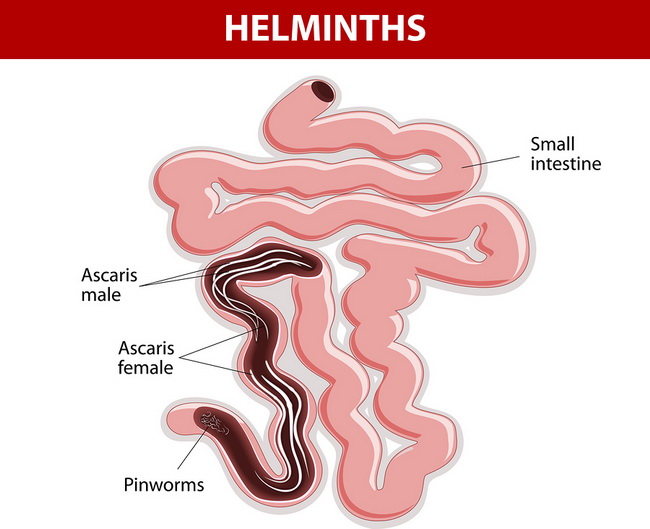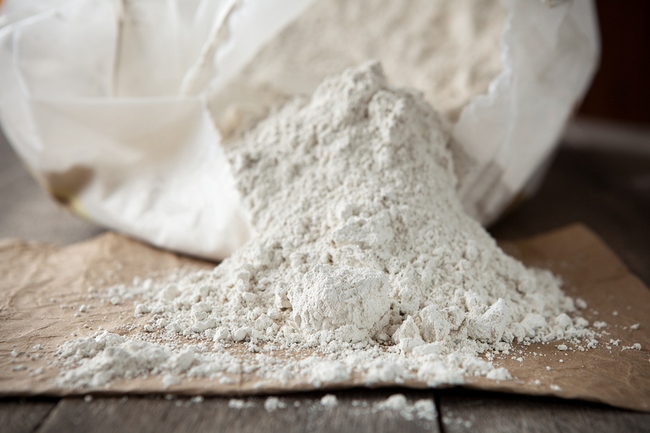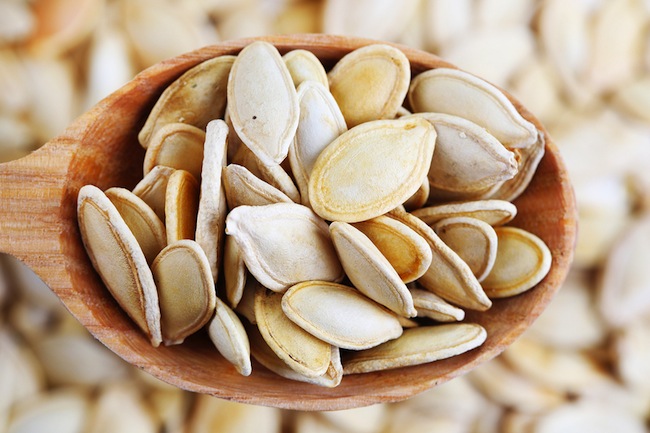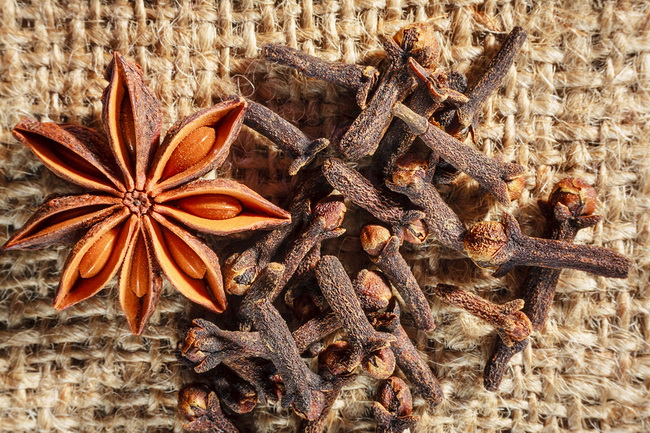- Make It Yourself Lavender Heart-Shaped Bath Bombs!
- 20 Things You Never Knew About “Down There”
- 12 Best Foods For Those Suffering From Arthritis Pain
- 12 Personal Hygiene Mistakes Almost Everyone Makes (Mom Never Told You About #4!)
- 15 Medicinal Plants And Herbs From The Cherokee People
- 12 Mind-Blowing Benefits Of Drinking Coconut Water During Pregnancy
- 12 Outstanding Winter Foods That Won’t Fatten You Up Like A Christmas Turkey
How to Tell if You Have Parasites and What to Do About Them

Photo credit: bigstock.com
Most Americans believe that internal parasites are something that happens to people in “other countries,” such as third world or developing countries. It is true that you will find parasites there, perhaps more so than more developed parts of the world, but that does not mean that parasites do not exist in more advanced cultures.
It’s pretty disgusting to think that you are a host to some type of bug that is living off of your body, but it is much more common than you might think. More than 3 billion people in this world suffer from some type of internal parasite, according to the World Health Organization, and not all of these people live in poor or underdeveloped countries.
You have probably heard (or seen) those horror stories of people throwing up 3 foot long tapeworms, and although some parasites can grow to enormous sizes, most of them are so small you can only see them in a microscope.
What kind of parasites are we talking about?
Your body is literally a walking, talking warehouse that is crawling with hundreds (maybe even thousands) of strains of yeast and bacteria. Your digestive track alone has about 3 pounds of bacteria. In the right balance, these bacteria are a good and necessary thing for proper digestion.
Parasites are classified into many different groups but for our purposes here, we can nail them down into two basic types: protozoa and helminthes. Helminthes are worms that cannot multiply inside the human body. Helminthes include such lovely worms as roundworms, pinworms, and tapeworms. (Yuck.) Protozoa, however, have only one cell and easily multiply inside the body and cause serious health issues.
Continue to Page 2

Photo credit: bigstock.com
How do we get parasites?
There are various ways to become infected with parasites. Coming into contact with infected feces through contaminated dirt, water, or food is one possibility. Poor hygiene, poor sanitation (such as improper cleaning and/or cooking food or dirty water), touching infected animals, and having a weakened immune system are also ways to become infected. Once you are infected, it’s easy to pass them on to other people.
There are a multitude of parasites and they can cause an almost unlimited variety of symptoms and only a few of these parasites actually live in the digestive system. If you find you have some of the symptoms below and feel as if you have tried everything to fix them with no results, you might want to consider that you have a parasite.
Symptoms that Indicate a Parasite Infestation
- Nausea and/or vomiting
- Bloody stools
- Low libido
- Stomach pains
- Anemia or iron deficiency
- Sleep disorders
- Weight loss
- Immune disorders
- Aching muscles, joints, or generalized pain
- Anxiety
- Depression
- Loss of appetite or food cravings
- Constipation or diarrhea
- Constant fatigue or exhaustion
- Skin problems
- Rectal itching, especially at night
- Intestinal cramps
- Brain fog
Of course, there are many more symptoms, but these are some of the most common and most obvious that there is some problem that needs to be addressed.
How to treat parasites in the body
The good news is that there are many natural treatments that can help kill and remove parasites from the body.
Continue to Page 3

Photo credit: bigstock.com
1. Diatomaceous Earth
This is a natural substance that can naturally kill parasite eggs, adult parasites, and yeast infections. DE is high in silica, which is vital for hair, nail, and skin. It improves digestion and restores body tissue. Be sure you are buying food grade diatomaceous earth. Start with 1 teaspoon in 8 ounces of water each day and gradually increase the dose until you are taking 2 tablespoons per day. Continue this dose until your symptoms disappear.
2. Apple Cider Vinegar
This is an old fashioned remedy that really works. Apple cider vinegar neutralizes the pH of the body while improving digestion. Fair warning: when you first start taking this, it tastes pretty awful. But after a while you become accustomed to it and don’t be surprised later if you find yourself craving apple cider vinegar! Begin with 1 teaspoon about 30 minutes before each meal. Work yourself up to taking 1 tablespoon before each meal. Again, continue until your symptoms disappear. Read about
3. Herbs
There are plenty of herbs that are well known for killing parasites such as:
- Wormwood
- Black walnut
- Garlic
- Goldenseal
- Anise
- Oregano (find out more about oregano oil effect)
- Cloves
- Olive leaf
- Thyme
- Barberry
- Oregon grape
- Curled mint
- Peppermint
- Rosemary
- Grapefruit seed extract
If you are taking other medications, always consult your doctor first to be sure there will no interactions between your prescriptions and your herbal treatment choice.
Continue to Page 4

Photo credit: bigstock.com
4. Homeopathic Treatments
Some of the homeopathic remedies for parasites include:
- Indigo
- Cina
- Stanum
- Teucrium
- Sabadilla
- Spigelia
- Podophyllum
Again, check with your doctor if you are taking any prescription medications.
5. Diet
Eating a diet rich in healthy, natural parasite killing foods can help. Consider consuming more of foods such as:
- Pomegranates
- Pineapple
- Pumpkin seeds
- Papaya seeds
- Carrots
- Beets
- Turmeric
- Cloves
- Raw garlic
One study showed that mixing raw honey with papaya seeds and drinking plenty of water killed parasites and flushed the digestive system. Also, eating more fiber can help rid the body of intestinal worms.
Avoid eating refined foods, sugar filled sodas or fruit juices, and sugar.
6. Cinnamon
This is another easy, yet tasty way to fight parasites and fungus. Take ½ a teaspoon of cinnamon either in a glass of water or in your coffee three times per day.
7. Vitamin C
Vitamin C is a super antioxidant and provides immune system support as well. Vitamin C is also very helpful in removing parasites from the body. Take 5,000mg each day. Spread it out over two or three doses and remember not to take it at the same time as a calcium or magnesium supplement as they neutralize each other.
Continue to Page 5

Photo credit: bigstock.com
How to prevent parasite infestation
Eating a diet that is rich in beta-carotene, which your body will turn into vitamin A, such as sweet potatoes, squash, and carrots, increases your natural resistance to parasites. Also, adding spices such as cloves and turmeric to your diet can help keep parasites from making your body their home.
Be sure to practice good hygiene at all times. It’s fairly easy to pass parasite eggs from a miniscule drop of feces into food and into another person. When you travel, always be very careful about where you eat, and drink bottled water. Always wash or use a vinegar soak to kill parasites on produce, especially those hard to wash items such as berries and watercress.
Sometimes when you try to remove parasites you might find that you begin to experience cold or flu like symptoms. This is quite normal, as removing parasites is hard on your body. Try to get more rest and drink more fluids and you should find that these symptoms pass quickly.
































